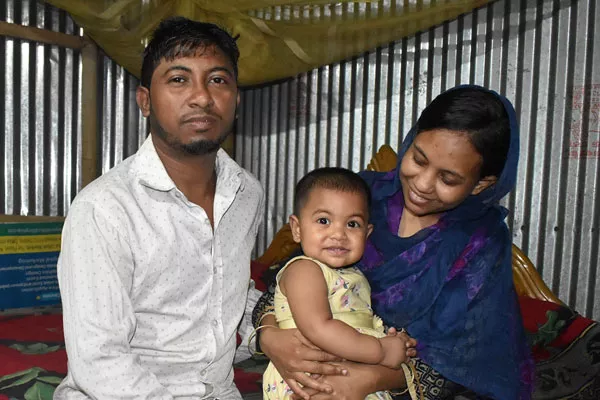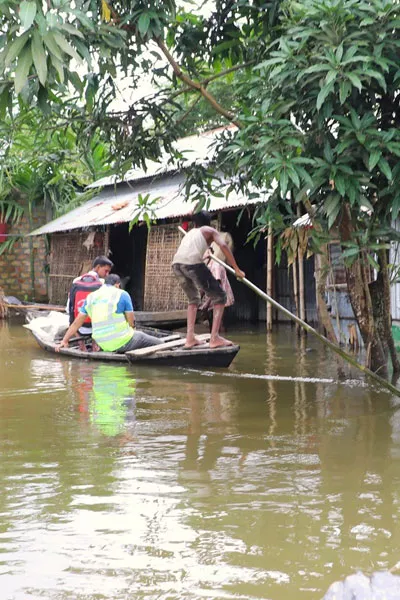Churab Ali survives the highest rainfall in 62 years in Sylhet, Bangladesh
Churab Ali*, a 35-year-old vegetable seller from Sylhet, Bangladesh, has faced numerous challenges running his small business. However, nothing prepared him for the devastating flood that struck his village in 2022. Growing up in poverty, Churab Ali had to forgo his education to support his family by selling vegetables. Living in a modest hut with his wife and infant daughter Fabiha*, they struggled to make ends meet.
In June 2022, heavy rains caused widespread flooding in northeastern Bangladesh. The region experienced the highest rainfall in 62 years, a clear indication of climate change. Churab Ali's hut was quickly submerged as the floodwaters rose rapidly, leaving no time for the family to salvage their possessions, including their livestock.

“Although flooding is a common phenomenon in Sylhet, it's not something that would hit my village ever. What happened this time is something none of us could have expected in our lifetime. We didn’t know what to do next,” says Churab Ali, who initially tried to seek refuge with the neighbours. The family waited for the floods to recede, but as the rains continued and the area got more and more flooded, the entire community had to be evacuated and relocated to a nearby school for safety.
A local humanitarian organization provided temporary assistance by offering dry and cooked food and sanitation products. Although conditions were challenging, the affected families understood the temporary nature of their stay and hoped to return home once the water receded. After 27 days, Churab Ali and his family returned to their hut to find only devastation. The flood destroyed their home, leaving behind broken fences, poles, doors, and an upturned mud floor covered in sludge. The task of rebuilding their home and livelihood was daunting.
Their savings were depleted and they had no idea what to do next. SOS Children's Villages in Sylhet was able to help through the Humanitarian Response to Flood Victim Families in Sylhet, Bangladesh project. They provided Churab Ali with livelihood recovery support to assist him in reopening his business.
With this assistance, Churab Ali says, "I was able to buy a stock of vegetables from the market and put it on sale in my cart to restart my business. Some money also went to make the house liveable for my family. Once I felt really in the dark after the floods and didn’t know how anything good would happen again. Now when I see my daughter's face, I feel confident that I can provide her with the secure environment she needs to grow up in. "
Impact of SOS Children’s Villages emergency response
The Humanitarian Response to Flood Victim Families in Sylhet, Bangladesh project provided various forms of assistance to flood-affected families.
-
190 families received livelihood recovery assistance of BDT 21,300 ( 262 Canadian Dollars), which was used for restarting small businesses and purchasing livestock and agricultural implements.
-
200 families received conditional cash assistance of BDT 19,000 (234 Canadian Dollars).
-
2,050 families received unconditional cash assistance of BDT 5,000 (62 Canadian Dollars) and a hygiene kit. The hygiene kit included two buckets with lids, one mug, two packets of sanitary pads, six pieces of laundry soap, and six pieces of bathing soap.
This emergency response program benefited a total of 2,440 families; helping more than 4,000 children and 7,000 adults.

Global Climate Risk Index
The Global Climate Risk Index rates Bangladesh as the seventh most affected country in the world by extreme weather events over the last two decades. Depending on the extent of sea level rise in the coming decades, an estimated 15 to 30 million Bangladeshis could be displaced from coastal areas. This can result in extreme poverty or family separation due to forced migration.
With its community-strengthening initiatives, SOS Children's Villages Bangladesh aims to not only provide immediate relief and support to families affected by climate change but also work towards long-term solutions that promote resilience and sustainability.
*Names have been changed to protect privacy.
